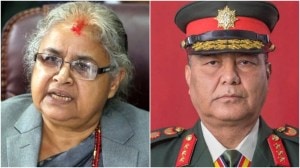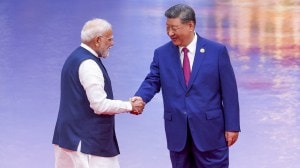Life goes on behind masked windows, cracked windows
They married 28 years ago after meeting at the university and living what he calls a ‘‘love story.’’ He became a famous ...

They married 28 years ago after meeting at the university and living what he calls a ‘‘love story.’’ He became a famous actor and theatre director; she pursued a career with the state radio.
They had two sons, followed by twin girls — babies who have grown into plucky dark-haired teenagers, making their parents proud by having read War and Peace and Gone With the Wind. By all appearances they are a happy, close-knit family, pursuing almost an American suburban lifestyle in the midst of Baghdad. But war is slowly and relentlessly encroaching on the family of Mohsen Ali and Jinan Abdul Hamid.
Masking tape has gone up on their windows and cracks have appeared in the plaster of their two-story villa from the concussions of the nearby air-defense guns.
On Tuesday afternoon, as a new round of explosions shook their neighborhood, Mohsen put his arm around his wife Jinan. On the couch next to them, twin sisters Miriam and Fatma, 14, chirped nervously. Miriam, the braver, feigned boredom, acting — her mother said — ‘‘as if on Valium.’’
Fatma, in a long-sleeved striped red T-shirt, is more frightened, putting her fingers in her ears and hunching down. Standing by the kitchen entrance is Omar, 22, a square-jawed aspiring actor, his body-builder muscles rippling with tension.
Since the outbreak of war March 20, the family has huddled in this house, situated just behind the former US Embassy in the Arasat district of central Baghdad. They no longer use their upstairs, and they sleep together in one room where the only window has been blocked by a bookcase.
Many nights, they say, they are still awake at 5 or 6 a.m., waiting for the bombing runs to end, before letting themselves drift off to sleep. Weighing on their minds is the knowledge that US forces are slowly advancing toward Baghdad, and a battle for the city is forecast.
‘‘Maybe some people were deceived that the Americans, when they come, would bring benefits — as if they planned to hand out dollars on the street,’’ said Jinan. ‘‘Now, everyone is convinced that they are savages, brutes.’’ But she quickly adds: ‘‘We don’t have anything against the America people. They have the best films, the best people, the best all over the world … (But) that respect for America has turned to hostility and emnity on the part of the Iraqi people.’’
Mohsen speaks of how heartened he is by American opposition to the war. He said he recently watched a tape of last month’s Academy Awards ceremony in Los Angeles, purchased at one of the local video shops still operating, and saw filmmaker Michael Moore denounce the war.
Jinan’s office and studio at Baghdad state radio are also idled. She fears she has lost her professional prizes during last week’s bombing of the state television centre, including the taped archives that record her long career as musical director of the station.
Unlike the women, father and son occasionally eave the house, Mohsen to trade gossip with actor friends and theatrical colleagues at a tea house off Sadoun St., Omar to take out his tensions lifting weights at the gym ‘‘even during the bombing.’’
Their oldest son Ali, 25, is safely out of Iraq, living in Doha, Qatar. Also an actor, he is now working as an editor at Al Jazeera. The family worries because they can no longer phone him to say they are unharmed.
Although they serve the cultural arm of the government, Mohsen says he is an independent man. Even in the presence of an official interpreter, he acknowledges to American visitors that there is opposition to the government of President Saddam Hussein. But he says the war is making people more loyal to their leader. Jinan said she was heart-broken by the report that US soldiers had killed seven women and children at a checkpoint in Najaf on Monday. ‘‘They say they are liberators, but their actions show tey are really behaving like invaders and criminals,’’ she said.
The severing of phone service occurred over the weekend — accomplished by precision strikes on local telephone exchanges across Baghdad — has also been a hardship, said Fatma. She used to talk several times a day to her best friend, checking to make sure she was safe. But for the past four days there is no contact, she said. The family fears the suffering will increase when US forces finally get to Baghdad.
It is a pleasant neighborhood of fenced-in single family homes, with yards out front and tree and shrub-lined driveways. Their misfortune, however, is that there are official buildings nearby and a presidential palace just across the river. (LA Times-Washington Post)
Photos



- 01
- 02
- 03
- 04
- 05



























